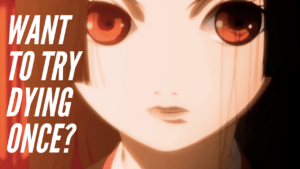Let’s learn Japanese with Ai Hoshino’s quote from Oshi no Ko (推しの子).
CONTENTS
Video
Ai Hoshino’s Quote
Japanese: アイドルは偶像だよ?嘘という魔法で輝く生き物。嘘はとびきりの愛なんだよ?
Romaji: aidoru wa gūzō dayo? uso to iu mahō de kagayaku ikimono. uso wa tobikiri no ai nan dayo?
English: Idols are objects of worship, you know? They sparkle through the magic of lies. Lies are the most exquisite love!
Analysis
アイドルは偶像だよ?
アイドル (noun) means “pop idols” who are entertainers marketed for image, attractiveness, and personality in Japanese pop culture. They’re usually trained in performance skills such as dancing, modelling, and acting, not just singing skills.
The は particle shows the previous word is the topic of the sentence, so in this sentence, she’s talking about idols.
偶像 (noun) means “objects of worship”. It’s derived from a sculpture or statue that people pray to as part of their religion.
だ (auxiliary verb) following a noun is used to affirm the statement.
よ is the sentence ending particle used to make the listener aware of the information.
So アイドルは偶像だよ means “Idols are objects of worship” which is a declarative sentence, not a question sentence. Then why is a question mark attached in the end?
When a question mark is used in a declarative sentence, it expresses a rising intonation to add a nuance of asking for confirmation like “you know?”, “OK?”, “yeah?”, “don’t you think?” and so on, depending on the context.
So アイドルは偶像だよ? can be translated as ”Idols are objects of worship, you know?”.
嘘という魔法で輝く生き物
“AというB” means “B called A”. The A is 嘘 meaning “lies” and the B is 魔法 meaning “magic”, so 嘘という魔法 means “magic called lies”.
で is the particle used to describe the means of an action, usually translated as “with” or “by”. The action is 輝く meaning “to shine” so it means “shine with magic called lies”.
And it modifies the following noun 生き物 meaning “living things” or “creatures”, so 嘘という魔法で輝く生き物 means “creatures that shine with magic called lies”.
The topic (アイドルは) is omitted as it’s already mentioned in the first sentence so the whole sentence is “(Idols are) creatures that shine with magic called lies”. In the anime, it’s translated as “they sparkle through the magic of lies”.
嘘はとびきりの愛なんだよ?
This time 嘘 (noun) is followed by the topic particle は, so in this sentence she is talking about “lies”.
とびきり (noun) is used to describe something that is highest of quality. It can be translated as “best” or “extremely good”. It’s followed by the modifying particle の and a noun 愛 meaning “love” so とびきりの愛 means “most exquisite love”.
なん is a contracted form of なの which is the combination of な (auxiliary verb) attached to the preceding noun and the explanatory particle の. And it’s followed by だ (auxiliary verb) to affirm the statement and よ (sentence ending particle) to make the listener aware of it.
This explanatory ん followed by だ is used when the speaker explains the reason or background of the context. In this case, she says that idols sparkle through the magic of lies and explains that it’s because lies are the most exquisite love for their fans.
And again, a question mark is attached in the end so 嘘はとびきりの愛なんだよ? can be translated as “Lies are the most exquisite love, OK?” But in the anime, it’s left out.
Examples
Question Mark in Declarative Sentences
急がないと遅刻するよ?
isoganai to chikoku suru yo?
If you don’t hurry, you’re going to be late, you know?
着いたら電話してよ?
tsuitara denwa shite yo?
When you arrive, call me, OK?
早く起こしてって言ったのはあなただよ?
hayaku okoshite tte itta no wa anata dayo?
You are the one who told me to wake you up early, you know?
AというB (B called A)
山田という人を探しています。
yamada to iu hito o sagashite imasu.
I’m looking for a person named “Yamada”.
近所にマンマミーアというレストランができた。
kinjo ni manmamīa to iu resutoran ga dekita.
A restaurant called Mamma Mia has opened near our place.
東京の浅草という町で育ちました。
tōkyō no asakusa to iu machi de sodachimashita.
I grew up in a town called Asakusa in Tokyo.
Explanatory (な)んだ
早くして!時間がないんだから。
hayaku shite! jikan ga nai nda kara.
Hurry up! Because we don’t have time.
美大生?だから絵が上手なんだ。
bidaisei? dakara e ga jōzu na nda.
(Are you) an art student? That’s why you are good at drawing.
空飛ぶ象なんてありえない。きっと夢を見ているんだ!
sora tobu zō nante arienai. kitto yume o miteiru nda!
The flying elephant can’t be real. I must be dreaming!
Support Easy Peasy Japanesey
If you enjoy our content, please consider supporting Easy Peasy Japanesey. Your support will help keep us going. Thank you for your support!


